กว่าจะถึงวันนี้... ภราดา ดร.บัญชา แสงหิรัญ : ABAC and the new tasks of the President
กว่า 4 ทศวรรษ ที่ภราดา ดร.บัญชา แสงหิรัญได้ทุ่มเทอุทิศแรงกาย แรงใจอย่างเต็มสติปัญญาและความสามารถในการปฏิบัติภารกิจในฐานะนักบวชของคณะเซนต์คาเบรียล โดยเฉพาะอย่างยิ่งบทบาทของการเป็นนักศึกษาและนักพัฒนาของท่าน ทำให้เราประจักษ์ในความรู้ความสามารถ ตลอดจนวิสัยทัศน์ที่กว้างไกลในด้านการพัฒนาระบบการศึกษาของสถาบันต่างๆ ในเครือคณะเซนต์คาเบรียลแห่งประเทศไทยในส่วนที่ท่านรับผิดชอบอยู่ และวันนี้สมาคมศิษย์เก่ามหาวิทยาลัยอัสสัมชัญ มีความยินดีและภูมิใจเป็นอย่างยิ่งกับภาระหน้าที่ใหม่ที่สำคัญยิ่งของท่าน ในฐานะอธิการบดีมหาวิทยาลัยอัสสัมชัญ...
สืบสาน ABAC สู่ความเป็นสากล World Class University…
“งานโดยส่วนใหญ่จะเป็นการทำงานที่ต่อเนื่องจากท่านอธิการบดีคนเก่าคือ ภราดา ดร.ประทีป ม.โกมลมาศ ซึ่งตอนนี้สภามหาวิทยาลัยได้แต่งตั้งให้ท่านดำรงตำแหน่งอธิการบดีกิตติคุณ คือเราต้องพยายามทำให้มหาวิทยาลัยของเราไปสู่ระดับมาตรฐานสากล หากถามว่าตรงนี้สำเร็จครบถ้วนเมื่อไหร่ ซึ่งต้องใช้เวลาอีกสักระยะหนึ่งในการปรับเปลี่ยนไปสู่สิ่งที่ดีกว่า โดยจะค่อยเป็นค่อยไปตามวิถีทางที่สอดคล้องกับวิสัยทัศน์และพันธกิจของมหาวิทยาลัย รวมถึงหลักปรัชญาของคระเซนต์คาเบรียลด้วย ปัจจุบันมีนักศึกษาทั้งจากในประเทศและจากต่างประเทศเข้ามาศึกษาต่อเพิ่มมากขึ้นเรื่อยๆ ดังนั้นการเป็น World Class University จึงอยู่ไม่ไกลเกินเอื้อม และในระยะ 5-6 ปีที่ผ่านมาบัณฑิตของมหาวิทยาลัยก็สามารถเข้าศึกษาต่อในมหาวิทยาลัยชั้นนำของโลกในสาขาวิชาต่างๆ ได้ทุกปี โดยเฉพาะในปี 2002 นี้ สามารถเข้าศึกษาต่อ MBA ที่ HARVARD University ได้ถึง 2 คน และ MBA ที่ MIT ได้อีก 1 คน นั่นย่อมเป็นเครื่องยืนยันถึงคุณภาพและมาตรฐานการศึกษาของมหาวิทยาลัยว่าได้เข้าสู่ระดับ World Class แล้วนอกจากนี้บัณฑิตของเรายังสามารถเข้าทำงานในบริษัทข้ามชาติ (multinational corporations) ได้เป็นจำนวนมาก สิ่งที่เราให้ความสำคัญคือการมีอาจารย์ที่มีคุณภาพ โดยเฉพาะด้านการเรียนการสอนและการวิจัย สองอย่างนี้เป็นของคู่กันต้องไปด้วยกัน ในเมื่อเรามีอาจารย์ที่มีมาตรฐาน มีการเรียนการสอนที่ดีแล้วก็ต้องมีสถานที่และสิ่งอำนวยความสะดวกที่ทันสมัยด้วย เราจะอยู่อย่างแออัดเหมือนสมัยก่อนไม่ได้ เราจึงต้องสานต่องานของท่านอธิการบดีคนเก่า โดยมุ่งมั่นให้วิทยาเขตบางนานี้เสร็จสมบูรณ์ให้ได้ ขณะนี้ได้ก่อสร้างไปแล้วประมาณ 40 % ต้องทำส่วนที่เหลือให้เสร็จสมบูรณ์ แต่ก่อนนักศึกษาอยู่ที่วิทยาเขตหัวหมากประมาณ 18,000 กว่าคนในที่ 16 ไร่ มันแออัด ถ้าเรามีพื้นที่บริเวณและสิ่งแวดล้อมที่ดี มีบรรยากาศดี นักศึกษาของเราจะเติบโตอย่างมีคุณภาพ มีความรู้ความสามารถ”
สร้างสรรค์บัณฑิต...ให้เป็นผู้มีความรู้คู่คุณธรรม
“เรามีจุดเด่นตรงที่เราใช้ภาษาอังกฤษเป็นภาษาสื่อสารและภาษาธุรกิจ หลักสูตรของเรามีเอกลักษณ์ที่โดดเด่น มีเนื้อหาของการบริหารจัดการเป็นพื้นฐานในทุกโปรแกรม พูดง่ายๆว่าเด็กของเราที่จบไปเราจะต้องให้เขาไปเป็นผู้ประกอบการไม่ใช่ให้แต่ทฤษฎีอย่างเดียว ต้องมีภาคปฏิบัติให้กับเด็กด้วย เรามีการจัดการเรียนการสอนด้านจริยธรรมวิชาชีพ (Professional Ethics and Service Learning) เพื่อสร้างนักศึกษาให้เป็นคนที่มีคุณธรรมในการปฏิบัติหน้าที่ หากถามว่าที่อื่นมีหลักสูตรอย่างนี้หรือเปล่า ตอบได้ว่ามี แต่สิ่งที่คนอื่นไม่มีคือ เราเป็นมหาวิทยาลัยคาทอลิก คำว่า คาทอลิก ไม่ได้อยู่ทีชื่ออย่างเดียว เรามีผู้บริหารเป็นนักบวช ดังนั้นในบริบทของมหาวิทยาลัยคาทอลิกที่มีผู้บริหารเป็นนักบวชจึงต้องมุ่งเน้นและให้ความสำคัญในด้านศีลธรรม จริยธรรม และจรรยาบรรณในการให้การศึกษาอบรมแกนักศึกษา และในการบริหารจัดการมหาวิทยาลัยในภาพรวมด้วย มหาวิทยาลัยอื่นก็มีหลักสูตรนานาชาติ ตึกอาคารเรียนใหญ่ มีนักศึกษาต่างชาติเหมือนกัน แต่คุณค่า (Value) ทางด้านการเรียนการสอน การสื่อสาร ความสัมพันธ์ต่อกัน มันเป็นคุณค่าทางศาสนาที่เรายึดถือปฏิบัติติดต่อกัน นั่นคือ ศาสนาคริสต์สอนเรื่องความรัก ความเมตตา การรู้จักเสียสละ การรู้จักรับใช้เพื่อนคนอื่น สิ่งต่างๆ เหล่านี้เราต้องพยายามปลูกฝังตัวของนักศึกษา ซึ่งสิ่งเหล่านี้ไม่ได้เกิดจากการเรียนการสอนอย่างเดียว แต่จะเกิดจากการมีปฏิสัมพันธ์ระหว่างผู้บริหาร คณาจารย์ นักศึกษาและบุคลากรทุกคน ไม่เกิดเฉพาะในห้องเรียนอย่างเดียว แต่เกิดในทุกขณะและเรียกว่าเป็นส่วนหนึ่งของชีวิตในมหาวิทยาลัย”
ABAC สอนให้นักศึกษาเรียนรู้สิ่งใหม่ๆ ตลอดชีวิต...
“เด็กจะบอกว่า ABAC เรียนยาก เรียนหนัก ทำให้ไม่มีเวลาไปทำกิจกรรมอื่นๆ ของมหาวิทยาลัยเลยอาจจะยากอยู่ตรงที่ภาษา เพราะใช้ภาษาอังกฤษเป็นสื่อกลาง แต่เฉพาะในช่วงแรกเท่านั้นเองที่จะต้องปรับตัว สิ่งที่บราเดอร์เห็นคือ นักศึกษาส่วนใหญ่มีเวลาว่างค่อนข้างมากแต่ไม่รู้จะทำอะไร บางทีเห็นนักศึกษาบางคนนั่งว่างอยู่ไม่ได้ทำอะไร บางคนก็คุยโทรศัพท์บ้าง ซึ่งไม่ได้อยู่ที่เขาไม่มีเวลา แต่ไม่รู้จักจะบริหารเวลาของตัวเองมากกว่า ไม่รู้จักใช้เวลาให้เกิดประโยชน์สูงสุด เขาลืมไปว่า “time is money” หรือเขายังไม่ซาบซึ้งในคำกล่าวที่ว่า “time and tide wait for no man” ตรงนี้เป็นจุดที่สำคัญ ถ้าเขาตระหนักในสิ่งเหล่านี้ เขาจะต้องศึกษาและเรียนรู้อยู่ตลอดเวลาเพื่อพัฒนาตนเอง ความสามัคคีไม่ได้เกิดจากการทำกิจกรรมอย่างเดียว เกิดจากหลายสิ่งหลายอย่างที่ถูกปลูกฝังในตัวของนักศึกษา แน่นอนกิจกรรมเป็นสิ่งหนึ่งที่มาช่วยสอน ต้องถามตัวเองก่อนว่าเรามาทำอะไรในแต่ละวัน ถ้าเพื่อนั่งฟังอาจารย์สอนแล้วก็กลับบ้าน มันก็ไม่เกิดประโยชน์เหมือนกับการเรียนของเขายังอยู่ในระดับมัธยม ตรงนี้
เคยมีใครคิดที่จะทำ เวลานี้ท่านให้หันมาดูภูมิปัญญาชาวบ้าน ท่านยังบอกเลยว่าแปลเป็นภาษาอังกฤษผิดไม่ใช่คำว่า local wisdom ใช้คำสูงไป อาจจะใช้คำว่า local knowledge มากกว่า ทำไมเราต้องนึกว่าชาวอเมริกัน ชาวยุโรปต้องมาสอน ในแง่ของการใช้ภาษา คนไทยอาจจะมีความรู้พอๆ กับคนอเมริกันหรืออาจจะดีกว่า เพราะในแง่ของความรู้ความสามารถนั้นสอนกันได้ แต่ถ้าพูดถึงสำเนียงเราสามารถเรียนรู้จากนอกห้องได้ด้วยการดูข่าวต่างประเทศต่างๆ ไม่ว่าจะเป็น CNN, CNBC, BBC แน่นอนว่าในการที่จะมาเป็นอาจารย์ได้ต้องมีการคัดเลือกว่าสำเนียงเขามาจากระดับนานาชาติหรือเปล่า ไม่จำเป็นต้องเป็นฝรั่งเท่านั้น อย่างตอนนี้ถ้าเราเปิดดู CNN หรือ BBC เราก็จะเห็นนักข่าวหลายคนเป็นชาวเอเชีย ซึ่งเขาสามารถสื่อสารออกมาได้ดี เพราะฉะนั้น ตรงนี้เราอย่าไปทำให้เกิดทัศนคติที่ไม่ดีต่อสิ่งต่างๆ เหล่านี้ แต่เราต้องหันไปสร้างมาตรฐานในเรื่องระดับการศึกษาของมหาวิทยาลัยเราให้ได้ และธำรงความเป็นชุมชนนานาชาติเพื่อการเรียนรู้ให้มีประสิทธิภาพตลอดไป”เขาต้องปรับเปลี่ยนวิถีของเขาให้ได้ เปลี่ยนจากระดับที่เป็นนักเรียน ซึ่งเรียนรู้จากอาจารย์อย่างเดียวมาเป็นนักศึกษาชื่อก็บอกอยู่แล้วต้องเป็นคนที่รู้จักศึกษาค้นคว้าแล้วรู้จักเรียนรู้ตัวเองอย่างต่อเนื่องและสม่ำเสมอ การเรียนมีหลายแบบ ครูที่ดีต้องสอนให้เด็กยืนบนขาตัวเองให้ได้ ครูเป็นเพียงผู้บริหารจัดการ บั้นปลายแล้วนักเรียน นักศึกษาต้องสามารถเรียนรู้ ค้นคว้าหาทางแก้ไขปัญหาต่างๆ ได้เมื่อเขาต้องประสบ เพราะชีวิตในอนาคตไม่มีอาจารย์อยู่ด้วย ตัวเขาเองต้องเป็นคนสอนตัวเอง ต้องขัดเกลานิสัยตัวเอง ไม่ได้ขึ้นอยู่กับตัวของกิจกรรมโดยเฉพาะ หลายคนเข้าไปทำกิจกรรมอาจจะทะเลาะกันก็ได้ ความหมายของกิจกรรมในตัวของมันเองนั้นไม่ได้ขัดเกลาคนเสมอไป แต่มันอาจจะทำไหในทางไม่ดีก็ได้ แต่ถ้าเรามีการเรียนรู้อยู่ตลอดเวลานำความรู้มารวมเข้ากับการปฏิบัติ สิ่งต่างๆ เหล่านี้จะทำให้เรียนรู้มากขึ้น นำสิ่งที่เรียนรู้มาเป็นส่วนหนึ่งของชีวิตพยายามปฏิบัติเหมือนอย่างสมัยก่อน เมื่อเราเป็นเด็กเรามักจะไม่อยากแปรงฟัน แปรงฟันแล้วมันเจ็บ แปรงแล้วถูกับเหงือก แต่อีกหน่อยพอรู้ว่าการแปรงฟันเป็นสิ่งสำคัญต้องทำให้ได้ ต้องฝึกหัดจนกระทั่งเป็นส่วนหนึ่งของชีวิต เราต้องทำให้ติดเป็นนิสัย”
ABAC…สอนให้รู้ถึงการเรียนการสอนแบบนานาชาติ
“หลายคนมีคำถามว่า ทำไม ABAC ถึงไม่ใช้อาจารย์เป็นฝรั่งหมด เราต้องมองก่อนว่าการสอนแบบนานาชาติหมายความว่าอย่างไร อาจารย์ที่เข้ามาสอนต้องมีการคัดเลือก โดยเน้นว่าต้องเป็นผู้ที่มีความรู้ความสามารถในเนื้อหาวิชาที่จะสอนจริงๆ ด้วยพิจารณาจากวุฒิปริญญา หลักฐาน หลักฐานการศึกษา และสถาบันที่สำเร็จการศึกษา และมีความสามารถในการใช้ภาษอังกฤษสื่อสารได้อย่างมีประสิทธิภาพถูกต้องตามหลักไวยากรณ์ ซึ่งไม่จำเป็นจะต้องเป็นฝรั่งเสมอไป เพราะในชีวิตจริงเมื่อสำเร็จการศึกษาไปเราจะต้องสัมผัสและมีปฏิสัมพันธ์กับคนหลายชาติหลายภาษาและวัฒนธรรม ดังนั้น เราจึงเลือกอาจารย์จากหลายชาติมาทำงานร่วมกันโดยไม่มีการเลือกปฏิบัติสิ่งนี้จึงทำให้ ABAC เป็นบรรยากาศของสังคมนานาชาติ (International Society) ที่มีนักศึกษา อาจารย์กว่า 57 ประเทศมาอยู่ร่วมกันอย่างสันติ เราอย่าไปแบ่งแยกว่าอาจารย์มาจากชาติไหน เคยมีสมัยหนึ่งที่คนไทยเรียกว่าบ้าฝรั่ง เราเรียกคนผิวขาวว่าฝรั่ง แล้วเราพยายามพูดถึงฝรั่งว่าเป็นคนยุโรปและยึดมั่นว่า อะไรก็ตามที่เป็นฝรั่งดี แม้กระทั่งผลิตภัณฑ์ของยุโรป แต่ในยุคใหม่เป็นยุคโลกาภิวัฒน์ ถามว่าของที่เราไปซื้อที่ยุโรปเป็นของอะไร ส่วนใหญ่ก็จะ made In China อย่างคอมพิวเตอร์เมื่อเปิดดูชิ้นส่วนข้างในหลายๆ ชิ้นบางชิ้นทำในเกาหลีหรือทำในไทยบ้าง เราไม่สามารถรู้ได้ ทัศนคติเกี่ยวกับฝรั่งว่าดีนั้นฝังอยู่ในตัวของเรา อย่างเมื่อวันที่ 4 ธ.ค. ที่ผ่านมา ในหลวงท่านทรงตรัสว่าหมากลางถนนของเราทำไมไม่เอามาเลี้ยง พาไปฝึกให้เก่งทั้งๆ ที่น่าจะทำได้ แต่ไม่
ABAC…มุ่งพัฒนาเทคโนโลยีที่เอื้อต่อระบบการเรียนการสอนที่มีประสิทธิภาพ
“คณะแรกที่เราเปิดคือ คณะบริหารธุรกิจ ต่อมาเราก็พยายามดูที่พื้นฐานของทุกอย่างว่ามาจากศิลปศาสตร์ มนุษยศาสตร์ ซึ่งเป็นพื้นฐานของทุกสาขาวิชา มันหลีกเลี่ยงไม่ได้ เพราะการที่จะทำให้คนเป็นคนต้องอาศัยวิชาเหล่านี้ไปช่วย ไม่ใช่คนเราเกิดมาเพื่อมีอาชีพอย่างเดียว หลายคนคิดว่าเรียนหนังสือเพื่อไปใช้หากิน ทำไมถึงต้องมาเรียนวิชาเหล่านี้ เราต้องสามารถสร้างคนให้อยู่ในสังคมอย่างมีความสุข เราต้องดูประเทศชาติว่าประเทศชาติต้องการอะไร โลกนี้ต้องการอะไร แล้วประชาชนของเราต้องการอะไร เราได้จัดการเรียนการสอนด้านบริหารธุรกิจมาระยะหนึ่ง และได้เห็นแนวโน้มความต้องการของประเทศในด้านเทคโนโลยีมากขึ้นมหาวิทยาลัยจึงได้เปิดดำเนินการจัดการเรียนการสอนในสาขาวิชาคอมพิวเตอร์ธุรกิจขึ้นในปี 2522 ซึ่งเป็นหลักสูตรแรกของประเทศไทย นับแต่นั้นเป็นต้นมา มหาวิทยาลัยก็ได้ทุมเททรัพยากรในการพัฒนาเทคโนโลยีมาก เพราะฉะนั้นเราจึงได้เตรียมความพร้อมทางด้านการสร้างเทคโนโลยี เรากำลังสร้างตึก IT ที่วิทยาเขตบางนา เราสร้างเพราะเราต้องการส่งเสริมทางด้าน IT มหาวิทยาลัยของเราเป็นสมาชิก (founding member) ของ Internet society แห่งเดียวในภาคพื้นเอเชียแปซิฟิก เราพยายามสร้างทางด้านนี้เพราะมันเป็นหนทางไปสู่ชีวิตที่มีความสุขในการเรียนรู้ได้อย่างกว้างขวางไม่มีวันสิ้นสุด อย่างเช่น Internet เพื่อให้นักศึกษาหาองค์ความรู้ประกอบการเรียนและบันเทิง อันเป็นการสันทนาการ แต่ต้องใช้ให้ถูกทางเพราะประโยชน์และโทษของ Internet อยู่ที่ผู้ใช้
ขณะนี้ทางมหาวิทยาลัยดูพื้นฐานของเรา ภาษาอังกฤษเป็นภาษาพื้นฐานทางธุรกิจ เพราะในโลกโลกาภิวัฒน์ เราใช้ภาษาไทยอย่างเดียวคนอื่นที่เป็นชาวต่างชาติก็จะไม่เข้าใจ เราต้องมีการเรียนรู้ภาษาอื่นเพื่อมาใช้เป็นตัวสื่อสารทางธุรกิจ ไม่ว่าจะเป็นภาษาอังกฤษ ภาษาญี่ปุ่น ภาษาจีน หรือภาษาฝรั่งเศส เพราะฉะนั้นนักศึกษาที่มาเรียนกับเราสามารถอยู่ในโลกธุรกิจได้ ในขณะเดียวกันความรู้ทางด้านธุรกิจ ด้านการจัดการ และความรู้ทางด้านเทคโนโลยี เพื่อนักศึกษาหรือบัณฑิตของเราจะได้อยู่ในกระแสโลกาภิวัตน์ได้อย่างมีความสุข”
ABAC… สร้างเพื่อน สร้างสังคม สร้างธุรกิจ
“การมี network ที่ดีสำคัญอย่างยิ่ง พูดถึงคำว่า network หมายถึง องค์กรต่อองค์กร นักศึกษาต่อนักศึกษา network ทั้งระดับแนวนอนและแนวตั้ง ดูอย่าง Internet ก็เป็น network อย่างหนึ่ง เราขาดองค์ความรู้เราก็เปิดหาความรู้จาก Internet ดึงมาใช้ประโยชน์ได้ มีเรื่องเล่าว่ามีคนอยู่คนหนึ่งเป็นโรคหนึ่งรักษามาเป็นสิบปีก็ไม่หาย เขาก็ Post ขึ้น Internet แล้วมีหมอท่านหนึ่งอ่านเจอจึงแนะนำวิธีรักษา ปรากฏว่าสามารถรักษาโรคหายได้ เพราะฉะนั้นตรงนี้สำคัญ ไม่ว่าจะเป็นเรื่องของการแก้ปัญหา เรื่องของการทำงานหรือ relationship ต่างๆ ยุคใหม่นี้ต้องอาศัย networking ตลอดเวลา เพราะฉะนั้นการที่เรารู้จักคนหลายๆ คน จะช่วยเปิดโลกทัศน์เปิดมุมมองในการติดต่อสื่อสารในการทำธุรกิจ ไปจนถึงการดำเนินชีวิตประจำวันซึ่งมีศิษย์เก่าและผู้ปกครองจำนวนมากเห็นว่าการที่ได้มา
ศึกษาเล่าเรียนที่มหาวิทยาลัยอัสสัมชัญนั้นเป็นโอกาสให้เขาหรือบุตรหลานของเขาได้มีโอกาสพบเพื่อนอันจะเป็น network ในทางธุรกิจต่อไปในอนาคต”
ต้องเรียนรู้เพื่อการพัฒนา ต้องก้าวหน้าอย่างมีจริยธรรม สิ่งเหล่านี้จะนำพาเราสู่ความสำเร็จที่ยั่งยืน...
“การที่เราจะประสบความสำเร็จในชีวิตต้องมี 3 สิ่งนี้คือ 1. ต้องเรียนรู้อยู่ตลอดเวลา ไม่ใช่ว่าอาจารย์สอนจบในห้องก็เลิก เราเรียนจบปริญญาตรีเราก็เลิกที่จะเรียนรู้ แต่จริงๆ ไม่ใช่ คนเราต้องเรียนรู้ตลอดเวลา แม้กระทั่งจบไปแล้วก็ต้องเรียนรู้ตลอด ต้องหาหนังสืออ่านเพราะว่า เราจะต้องแก้ไขปัญหาตลอด 2. ต้องรู้จักปรับเปลี่ยน ต้องทันต่อเหตุการณ์ของโลก โลกมันเปลี่ยนแปลงอยู่ตลอดเวลา ถ้าเราไม่เปลี่ยนเราก็จะเหมือนกับช้าง ตอนนี้ไดโนเสาร์มันตายไปแล้ว ช้างกำลังจะเริ่มตายแล้ว เพราะมันเริ่มหาที่อยู่ไม่ได้ ไม่มีอะไรให้กิน จึงต้องมาเดินตามถนนอย่างนี้ ทุกคนต้องสามารถปรับเปลี่ยนให้ทันต่อเหตุการณ์ของโลกให้ได้ถ้าไม่ทันก็จะกลายเป็นผู้แพ้ส่วนใหญ่ถ้าเรามีเทคโนโลยี แล้วเราไม่รู้เราก็จะไปไมทัน 3.จะต้องเป็นคนที่มีศีลธรรม คุณธรรม จริยธรรมในตัวเอง ไม่งั้นโลกจะยุ่งเหยิงไปหมด 3 สิ่งนี้เป็นส่วนที่สำคัญมาก โดยเฉพาะอย่างยิ่งต้องมีคุณธรรม ไม่อย่างนั้นแล้วศาสนาต่างๆ ก็ไม่มีประโยชน์ มนุษย์เราอยู่ด้วยกันต้องรู้ว่าอะไรถูก อะไรผิด ต้องรู้จักเลือก ต้องรู้จักเสียสละ เราอยู่ในสังคมต้องพึ่งพากัน รักกัน เราต้องเป็นคนเก่งด้วย ดีด้วยและต้องมีสุขด้วย เก่งเพื่ออยู่ให้รอดทันโลกทันเหตุการณ์ ดีด้วยคุณธรรมประจำใจ ความสุขก็จะสถิตอยู่กับเราชั่วนิรันดร์”
ภราดา ดร.บัญชา แสงหิรัญ
อธิการบดี มหาวิทยาลัยอัสสัมชัญ
ประวัติการศึกษา :
|
พ.ศ. 2540 |
|
|
พ.ศ. 2538 |
|
|
พ.ศ. 2524 |
|
|
พ.ศ. 2514 - 2517 |
|
ประสบการณ์การทำงาน :
|
1 พ.ย. 2545 |
|
|
พ.ศ. 2537 |
|
|
พ.ศ. 2544 |
|
|
พ.ศ. 2543 |
|
|
พ.ศ. 2541 |
|
|
พ.ศ. 2517 |
|
|
พ.ศ. 2534 - 2537 |
|
|
พ.ศ. 2528 - 2533 |
|
|
พ.ศ. 2522 - 2526 |
|
|
พ.ศ. 2521 - 2527 |
|
|
พ.ศ.2517 - 2520 |
|
|
พ.ศ. 2510 - 2513 |
|
|
พ.ศ.2543 - ปัจจุบัน |
|
|
พ.ศ. 2540 - ปัจจุบัน |
|
|
พ.ศ. 2544 |
|
|
พ.ศ.2540 - 2544 |
|
|
พ.ศ. 2527 - 2542 |
|
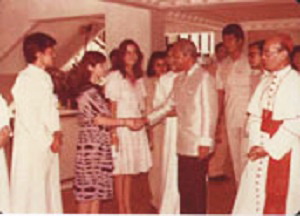 |
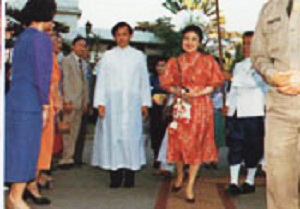 |
 |
For over 40 years, Reverend Brother Dr. Bancha Saenghiran has dedicated his physical strength and mental powers to fulfilling his duties as a Brother of the St. Gabriel’s Foundation of Thailand. He has developed confidence in his knowledge, talent and vision, thanks to his vast experience working at various institutions operated by the Order. Today ABAC Alumni Association proudly welcomes his recent appointment as President of Assumption University and has requested an interview with him. Here is what he has to say about his visions and his responsibilities.
The establishment of AU as world - class university:
“The duty before me is mainly to continue the work begun by the former Rector, Reverend Brother Dr. Prathip Martin Komolmas, who has, at this moment, been appointed President Emeritus by the University Council. Our mission is to continue to develop our university into a global institution. If anyone should ask at this point when this will be achieved, the answer is that it will take time to effect changes for the better. We must move forward, step by step, in accordance with the university’s vision and mission, working methodically and patiently to realize the philosophy of the Brothers of St. Gabriel. At present we have students coming from within the country and overseas to pursue studies here, and their numbers have been growing steadily. But most of all, we can regard the successes of our graduates as proof of the quality and high standard of our university. In the last five to six years, Assumption University graduates have enrolled in leading universities around the world to study in different fields. In particular, in the year 2002, two graduates have been admitted to the MBA program at Harvard University, and one student at MIT. Besides this, many of our graduates were able to obtain jobs at multinational corporations.”
“AU attaches great importance to the quality of its teachers, the methodology of teaching, learning and research. These go hand in hand. But in addition to attracting qualified teachers, and to providing a good teaching and learning environment, we must improve facilities for our students. It is not possible to continue in the crowded conditions we have at Hua Mak Campus. Where more than 18,000 students were crowded within a 16 –rai plot, we must continue the work of the former Rector to develop the Bang Na Campus. Forty percent of this has now been completed. With more space and better surroundings, our students can achieve quality, knowledge and develop their potential.”
The education of graduates who possess knowledge and integrity:
“One special characteristic is that we use English as the language of instruction. Our courses are also unique because business management is at the base of every program we teach, and our graduates are trained as managers, with solid theoretical knowledge as well as a practical background. Moreover, professional ethics and community service will ensure that they are graduates with integrity. This may not sound so different from other institutions, but we regard these as unique features of a Catholic university. It means that, in the context of the Catholic university, the administrators must pay attention to morality, ethics and good behavior, all important elements of our education. Other universities are known to have international programs, large facilities and students from overseas, but our values are defined by the Christian concepts of love, kindness, and sacrifice which we, endeavour to instill in our students. The continuous interaction between administrators, faculty, personnel and students, not only in the classroom but in all aspects of university life are significant.”
Teaching students how to learn about new things throughout their lives:
“Students often say it’s hard to study at AU, therefore they don’t have time for other activities, It may be true that studying here is difficult because English is the medium of instruction. But this is only in the beginning when students need to adjust to a new language. However, I often that students are free and don’t know what to do so they simply do nothing or use the telephone a lot. It’s not that they don’t have free time. But they don’t know how to mange their time and use it to their advantage. They forget that “Time is Money,” or simply that “Time and Tide Wait for No Man.” If they learn the importance of time management, they will always acquire new ideas. Unity, for example, is not the result of activity alone, it is the result of many things. Attending classes, and going home, is a basic activity of students and they have known this since high school. But at university level, they have to adjust to life and their ways of thinking, and change from students who learn from teachers, to students who know how to look for knowledge and learn how to learn by themselves. There are different methods of learning how to depend on oneself. The teacher becomes the manager who encourages students to study and look for solutions to problems, because in the future there will be no teacher to stand by them. Students must learn to teach themselves, and adjust their behavior to their surroundings. All these things cannot be learned through specific programs, however carefully they may be chosen. On the contrary, activities often lead to lights and quarrels, and the effect can be adverse to its real aim. But if we acquire knowledge, and apply this to our lives, we have learned and gained something. Simply think of how much we had to adjust when we were young. Nobody wants to brush their teeth because it hurts, but knowing that it is necessary as well as important we keep it up, we adjust, and it becomes a regular habit and a part of our lives.”
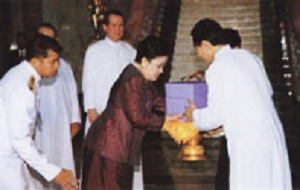 |
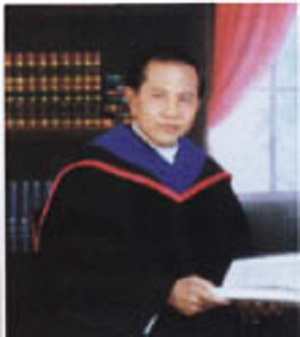 |
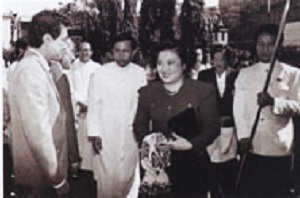 |
The creation of an international teaching learning environment:
“Many people keep asking why AU does not have a faculty entirely of foreigners. In order to answer this question, let us first look at what it means to study at an international level. Faculty at this university is selected according to their expertise in their fields; their educational qualifications and the universities where they have studied; as their ability to teach in English and use English efficiently. It is not necessary to look for foreign teachers only, because in the world arena, graduates will meet with people of various nations and cultures. Therefore, we choose teachers without discrimination. We have a truly international atmosphere here with both teachers and students form some 58 countries. At one time in Thailand we went crazy about foreigners, who were understood to be from Europe, and considered as good as their products. But in this global society, when we buy goods from Europe, they are likely to be made in China, or Korea, or Thailand, but we don’t know it, and believe that everything foreign is good. On December fourth, His Majesty the King suggested that Thai people should breed Thai dogs and train them. Before that nobody ever thought about it. His Majesty also praises Thai wisdom, but the word “local wisdom” should be more appropriately translated as “local knowledge.” Americans and Europeans are competent in their own languages, but Thai people can acquire the skill and the pronunciation of native speakers by practicing outside class, by watching news such as CNN, CNBC and BBC. One thing required of our teachers is international intelligibility. If we watch CNN or BBC we see many Asian newscasters who speak perfect English. Therefore, let us not create false values, but let us look toward to creating a world-class standard of education and to fulfilling the need for knowledge to serve our international community.”
The development of technology to facilitate the teaching-learning process:
“Our first faculty was Business Administration, and then when we look at the foundation of all our studies, we discern that it is Liberal, an essential part of education if we aim to develop human beings, because we are not born just to work. Some may think that studying means the acquisition of skills to be able to work, but we also need people in society who are able to build a happy and harmonious life. This is what people need, what the nation needs and what the world needs. When Business Administration and Arts had developed to a certain point, the university saw the need for teaching computer management, which was the first course of its kind in Thailand, Since then, the university has concentrated on building technology resources because the world gives so much attention to technology. The construction of the new IT Building at Bang Na campus is proof of the progress we have made with information technology, in particular since we are the founders of the Internet Society, the only one in the Asia Pacific region. Whether IT is beneficial or harmful depends on the user, of course.”
“Language is important at the university, because in an international world we cannot use Thai, For this reason, English, French, Chinese and Japanese are major language courses so that our students can communicate efficiently in the business world. With their background in business, management and information technology, the students can enter the current of globalization without fear.”
Helping to create a network of friends, societies and business:
“A good network is important, such as a network of organizations and a network of students. It works horizontally and vertically. Just like the Internet, which we can hook up if we are looking for information. Students should form a network to consult with each other. There is the story of an ailing person who had been looking for a cure for a long time. Then one day he posted his symptoms on the Internet, and a doctor who read it was able to suggest a successful cure. There may be may such important matters, whether it is a problem at work, or a problem with a relationship. In this age networking is important. It can open up the world for both business and a happy way of life. Both students and parents share the opinion that studying at Assumption University has enormous benefits, for here they will meet friends and create opportunities for future networking.”
The development of ethics to maintain happiness and success:
“In order to sustain continuous happiness, three things are very important, First, keep learning all the time. The completion of your studies at a certain level is not an ending. Many stop learning after they have obtained their degrees, but in reality, we must keep learning all of the time. We should continue reading and solving problems. Second, learn to adjust. The world keeps changing all the time, so we must keep up with events and adjust ourselves to new circumstances. If we do not change we will be like elephants. The dinosaur is already dead, and now the elephants are in danger of becoming extinct because they are being driven from their habitats. If we cannot adjust we will lose. Also, with technology, if we do not know how to use it , we cannot keep abreast of progress.Third, we must have morality and ethics, otherwise the world will be in trouble. These three things are important, in particular ethics, otherwise religion will be eliminated and life will become meaningless. As men live together they must know what is right and wrong, they must make ethical decisions and be able to sacrifice. In society we depend on each other and must love one another. Then we will be clever and good and happy: clever to survive in this changing world, good at heart and with integrity, so that we will always be happy.”
Rev. Bancha Saenghiran, f.s.g., Ph.D.
President, Assumption University
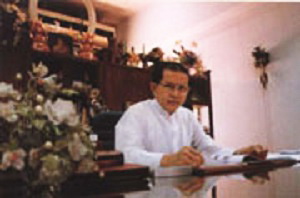 |
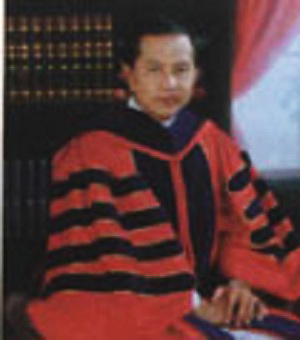 |
Education Background:
|
1997 |
|
|
1995 |
|
|
1981 |
|
|
1971 - 1974 |
|
Professional Background:
|
Nov.1, 2002 – present |
|
|
1994 - present |
|
|
2001 |
|
|
2000 - present |
|
|
1998 - present |
|
|
1974 - present |
|
|
1991 - 1993 |
|
|
1985 - 1990 |
|
|
1979 - 1983 |
|
|
1978 - 1984 |
|
|
1974 - 1977 |
|
|
1967 - 1970 |
|
Professional Membership:
|
2000 - present |
|
|
1997 - present |
|
|
2001 |
|
|
1997 - 2001 |
|
|
1984 - 1999 |
|
แหล่งที่มา : ABACA PROFILE (October-December 2002)

